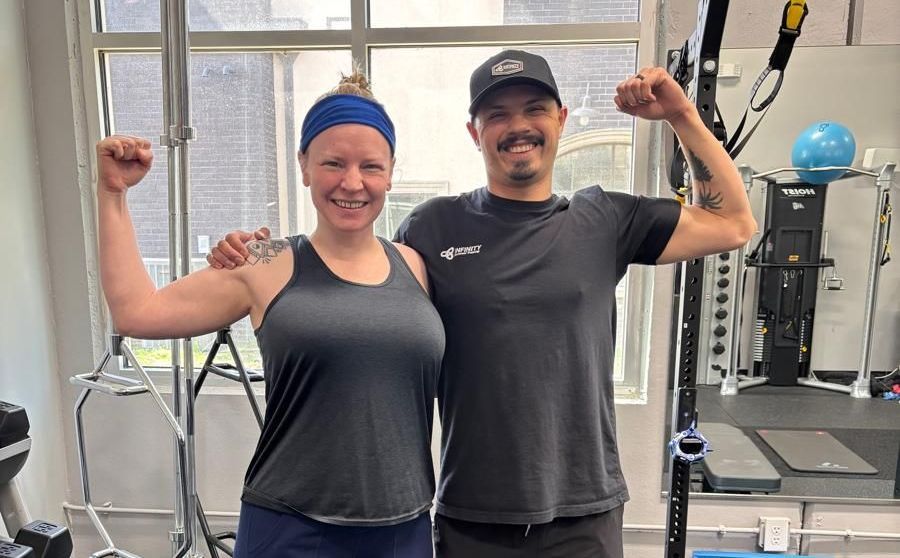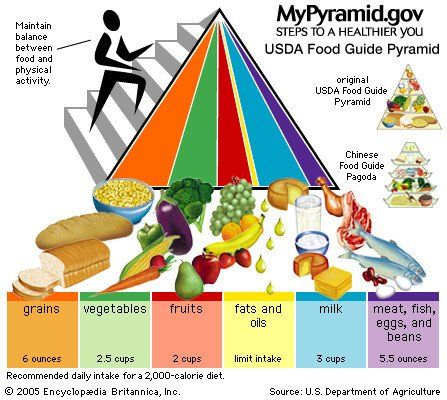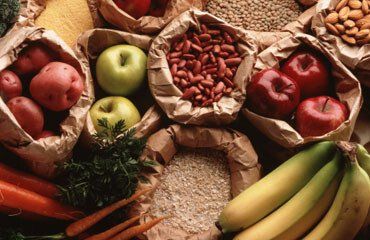"I Struggle with Food Groups...What is a carbohydrate?"
Above is the closest thing to a good breakdown of food groups I could find. Pay no mind to the serving suggestions but I will say no wonder people are confused! Most food pyramids, plates, etc lump food groups together that do not make sense. For instance fruits AND vegetables as well as meats, eggs AND beans! These foods are very different in carbohydrate, protein, and fat composition.
In Part 1 below we address carbohydrates without getting into the science and trying to keep this as basic as possible. Sooooo....here we go....
CARBOHYDRATES
What you need to know:
- they contain 4 calories per 1 gram.
- There are high glycemic and low glycemic carbs.
- Generally speaking you want to stick with low glycemic load (glycemic load charts can be found all over the internet) carbohydrates to maintain stable blood sugar levels throughout the day.
- The glycemic load of carbs can go down when combined with protein and/or fat.
- It's best to try and shoot for a 5:1 to a 3:1 ratio of vegetables vs. fruits. That means if you gain weight easily you should eat 5 servings of veggies for every 1 serving of fruit. On the flip side if you are not watching weight gain so much you may be able to go to a 2:1 ratio.
What are carbohydrates? Think starchy, grainy, sugar, flours, fruits, etc. Below is how I would break up carbohydrates by group. Keep in mind the unprocessed carbohydrates below contain a good amount of fiber hence why they are better than the common processed ones.
Fruits - Berries, Melons, Bananas, Grapefruit, Oranges, etc.
Unprocessed Whole Grains - Rice, Quinoa, Oats, Amaranth, Barley, Millet, Buckwheat, etc.
Other Unprocessed Carbs with a good amount of calories - Potatoes, Yams, Squashes, Beans (all varieties), Lentils, Peas
Unprocessed Carbs with very little calories - almost all vegetables especially leafy greens and things like broccoli, cauliflower, herbs, onions, spices etc. Any veggies that aren't very sweet especially when cooked (for example, sweet potatoes get sweeter when cooked as do carrots).
Processed "Whole Grains" (the guys that cause most weight gain issues) - Bread, Pasta, Pastries, Flour Products, Rice Cakes, etc.
Common Misconceptions:
- The processed "whole grains" are really good for you. The most common is wheat bread, whole grain cereals, etc. Contrary to some beliefs many of these turn into sugar quickly, have tons of added sugar and preservatives, and are lacking nutrients because once something is processed it generally means some or most of the nutrients in the germ of the grain, etc are lost.
- Beans are a protein dominant food. This is not true. Although they are higher than many other foods in protein, they are still carbohydrate dominant but they are fiber and nutrient dense which makes them a "good" carbohydrate. They usually have about a 3:1 ratio of carbs to protein.
- Fruit is bad. Fruit isn't bad unless you go overboard with it (eating 5 plus servings a day) or have insulin issues. For weight loss, we recommend the less sugary fruits like berries and green apples.
- Vegetables have a lot of calories. This is far from the truth unless we are talking potatoes, yams, etc. You can almost eat a limitless amount of things like broccoli, brussel sprouts, etc. Its almost impossible to gain weight doing this because they are so fiber dense you generally get full very quickly.
There you have it! A basic breakdown of carbohydrate dense foods. If you still have further questions, please don't hesitate to ask below or send me an email at cattaneo.ray@gmail.com!
Hope that helps!
With Your Health in Mind,
Ray Cattaneo
Owner
NASM - CPT, CES
CF -L1
P.S. If you thought this was helpful please share by hitting one of the buttons above! Also, if you're interested in getting started on any of our training or nutrition programs, we have a 6 week intro program to see if we are good fit for you but first CLICK HERE to schedule a no obligation consultation!
You might also like






